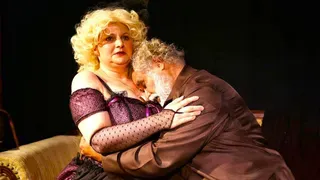March 5, 2013
American Honor Killings: Desire And Rage Among Men
Kilian Melloy READ TIME: 2 MIN.
David McConnell delves into the shadowy realm of what drives men to attack and kill gays in a book that's both deeply researched and informally reported.
"American Honor Killings: Desire and Rage Among Men" relates a number of such cases, approaching the issue of anti-gay violence from different angles. Some of the killers are straight, some are gay; so-called "gay panic" rears its head, but takes on different meanings in various contexts. The central idea is that these killings all relate back to a male conception of honor, whether personal or communal, and the murders (and other forms of mayhem touched upon along the way) spring from a need to uphold this idea of honor.
In one case, a pair of brothers essentially declare war on the usual targets identified by the conservative religious fringe. They attempt arson against Jewish houses of worship and abortion clinics; they murder a gay couple, evidently to make a statement about doing what they see as "God's work."
In another case, a young man from a nice suburban home falls in with a gang and, when his best friends discover evidence of a same-sex flirtation, is executed by his best friends on orders from a gang leader, seemingly in order to preserve the group's image.
McConnell also reports on the infamous case of the so-called "Jenny Jones" killer. Jonathan Schmitz was taped for a 1995 episode of the talk show that never aired, but which became somewhat synonymous with the modern conception of "gay panic." Schmitz was part of an episode focusing on secret crushes; he was hoping that the mystery person would turn out to be his ex-girlfriend. When it turned out instead to be a male acquaintance, Scott Amedure, Schmitz fell into a spiral that ended with Amedure's shotgun killing. McConnell parses and reconstruct the sequence of events that led to the murder, and fills in details about the aftermath.
Similarly, the book recounts the murder of ABC reporter George Weber at the hands of a 16-year-old bladed weapons enthusiast named John Katehis. Weber had evidently hired the teen to choke him for sexual gratification, but things took a lethal turn. Weber ended up dead from more than 50 stab wounds. Was Katehis a victim fending off an older predator? Was he a lost soul struggling with gay impulses? Was he simply evil? McConnell gives these questions their due and sheds light on both Katehis and Weber as human beings with complex histories, desires, and motivations.
McConnell tells these stories through the personal lens of his own experiences, observations, and responses. Moreover, he manages to extend sympathy to perpetrators as well as victims. The result is a blend of true crime journalism and sociological treatise, fascinating and sometimes chilling to read.
Kilian Melloy serves as EDGE Media Network's Associate Arts Editor and Staff Contributor. His professional memberships include the National Lesbian & Gay Journalists Association, the Boston Online Film Critics Association, The Gay and Lesbian Entertainment Critics Association, and the Boston Theater Critics Association's Elliot Norton Awards Committee.




